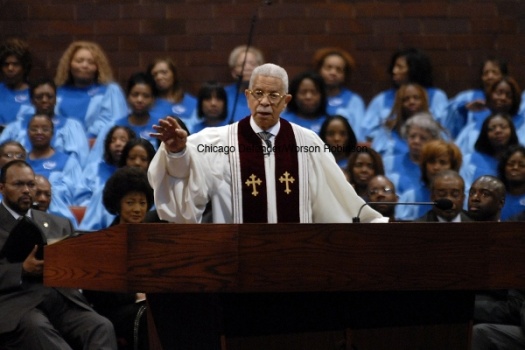
A source close to the family of Bishop Arthur M. Brazier said that when President Barack Obama recently contacted the bishop while he was on his sick bed, Obama cried.
@font-face { font-family: “Times New Roman”; }p.MsoNormal, li.MsoNormal, div.MsoNormal { margin: 0in 0in 0.0001pt; font-size: 12pt; font-family: “Times New Roman”; }table.MsoNormalTable { font-size: 10pt; font-family: “Times New Roman”; }div.Section1 { page: Section1; }
A source close to the family of Bishop Arthur M. Brazier said that when President Barack Obama recently contacted the bishop while he was on his sick bed, Obama cried.
That call to Brazier’s hospital room came two days before the pastor emeritus of Apostolic Church of God died Friday. He was 89.
Brazier had battled prostate cancer for five years, his family reported, before he succumbed to the disease at Northwestern Memorial hospital “peacefully in his sleep with his family around him.”
Now Obama, who visited Brazier’s church but never became a member, joins the 20,000-strong congregation, family and friends in mourning a preacher known as much for his leadership in the church as for being a stalwart of the Woodlawn community.
“My mission is to build on the work of my father,” Dr. Byron Brazier, pastor of the church, said of his dad at a press conference Friday.
Bishop Brazier was born in Chicago and raised on the South Side where he attended Wendell Phillips High School before going off to WWII. After returning from the war following an honorable discharge, Brazier went on to work as a letter carrier for the postal service and attended and graduated from Moody Bible Institute.
He took the helm of Apostolic Church of God in 1960.
“My father had a keen sense of vision and purpose,” Dr. Brazier said.
Bishop Brazier was widely known not only as the pastor who grew the South Side church from a membership of 100 to now well over 20,000. But he was also known as a man who stirred up controversy with political, civic and business powers-that-be as he sought to transform life in and for the residents of the Woodlawn community where the church is located.
A year after becoming the head of Apostolic, Brazier founded The Woodlawn Organization, a venerable community service agency that provides a myriad support and services. He served as T.W.O. president for a decade before resigning to work with Citizens Crusade Against Poverty.
In 1966 Bishop Brazier invited Dr. Martin Luther King Jr. his church’s Bible Conference.
“Their like passion for civil rights led to the two men protesting, together, against segregated housing and schools in Chicago,” according to a written statement from the church.
Through the years Brazier’s pastoral and civic work continued as he built an addition to the church’s edifice – creating an overflow sanctuary, and adding a community center, book store, dining hall and other amenities – developed housing in the surrounding community, became instrumental in drying up the nearby area, forged partnerships with local businesses including the University of Chicago and honed political, business and civic friendships.
The results of which earned the avid tennis playing pastor the love and admiration of his flock, and reverence outside of the church; but none of which came without flack.
“I remember how my father was undeterred by criticism,” Dr. Brazier said, explaining that his father took the ministry from the confines of the church and promoted better living in the community.
Most recently, Bishop Brazier was involved in developing the Woodlawn Children’s Promise Community, a community service project that reaches out to over 7,000 Chicago Public Schools students in the nine traditional elementary schools and one charter school in Woodlawn.
The organization’s Acting Executive Director Charles Payne became emotional Friday in reflecting on Bishop Brazier and his community work and efforts with the youth.
“He spent the last 50 years of his life fighting for this community,” Payne said tearfully.
He credited the bishop with getting stubborn parties to the table to hammer issues and craft agreements for the betterment of young people and the community.
Outpourings of condolences came quickly as news of Bishop Brazier’s death spread.
“There is no way that we can replace the gentle heart and boundless determination that Bishop Brazier brought to some of the most pressing challenges facing Chicago and our nation. However, his spirit will live on through the parishioners, leaders and friends that he touched each day,” Obama said in a written statement from the White House.
Brazier was said to be a “strong partner” with the Chicago Urban League.
“We will miss him but will never forget his legacy of leadership and service,” said Urban League President and CEO Andrea Zopp.
Cook County Board President Todd Stroger remembered Brazier as a “fearless spiritual leader … A gentle giant with a strong social conscious and determination to right external and internal wrongs.”
Mayor Richard M. Daley, Gov. Pat Quinn and other elected officials also extended condolences to the Brazier family and remembered a Bishop Brazier who was as life-changing in the community as he was in the pulpit.
He retired as pastor of the church June 1, 2008.
Brazier is survived by his wife, Ester Isabelle; son, Dr. Byron Brazier; daughters, Lola Hillman, Janice Dortch and Rosalyn Shepherd; seven grandchildren, and 11 great-grandchildren.
Services for Bishop Arthur M. Brazier will be held Thursday and Friday at Apostolic Church of God. On Thursday from noon to 6:30 p.m., his body will lie in repose for public viewing in the church’s Dorchester Sanctuary.
Friday from 8 a.m. to 9:30 a.m., the public viewing will continue, followed by the wake at 10 a.m. and funeral at 11 a.m.
Copyright 2010 Chicago Defender
(Defender/Worsom Robinson)
